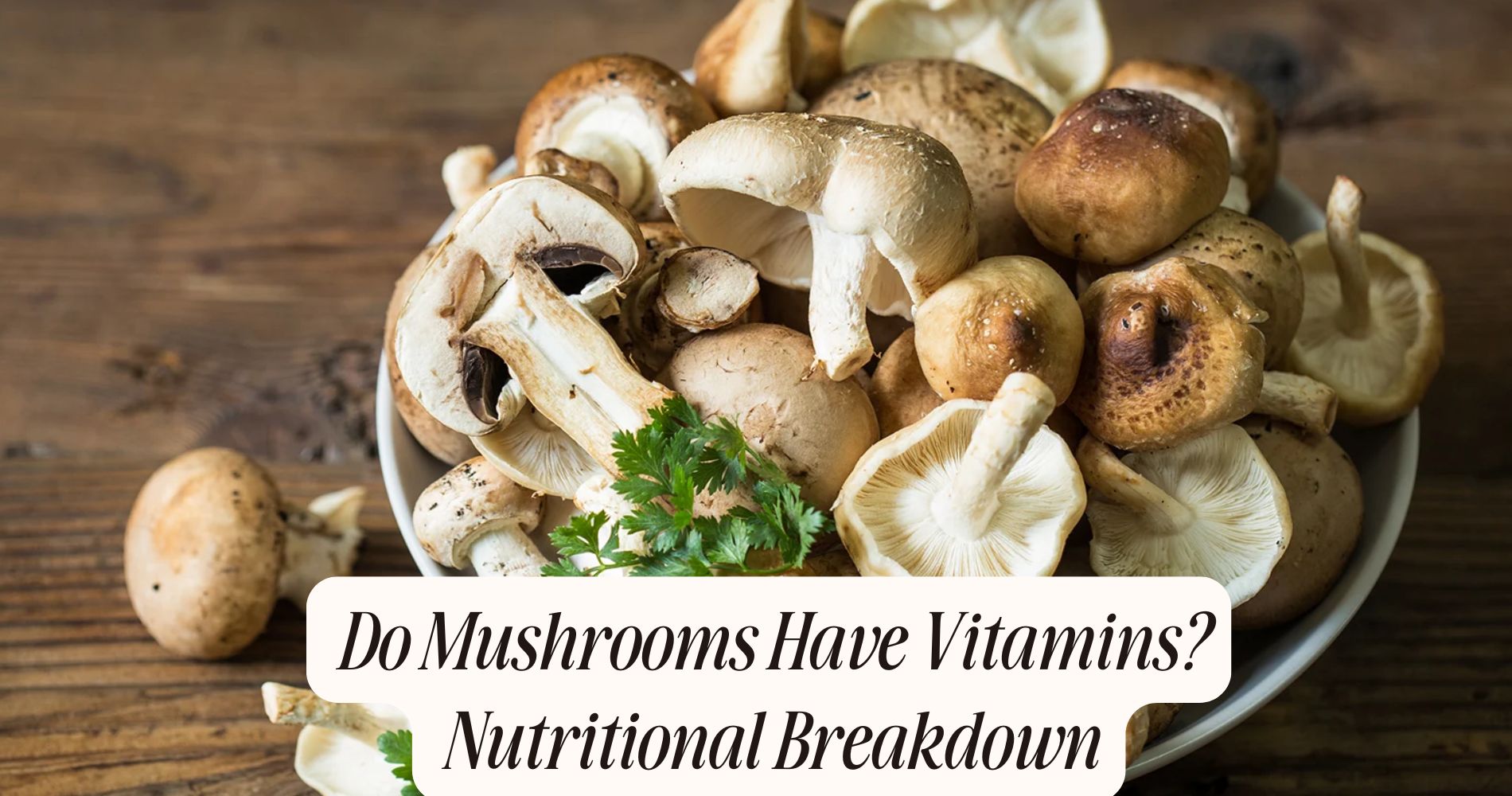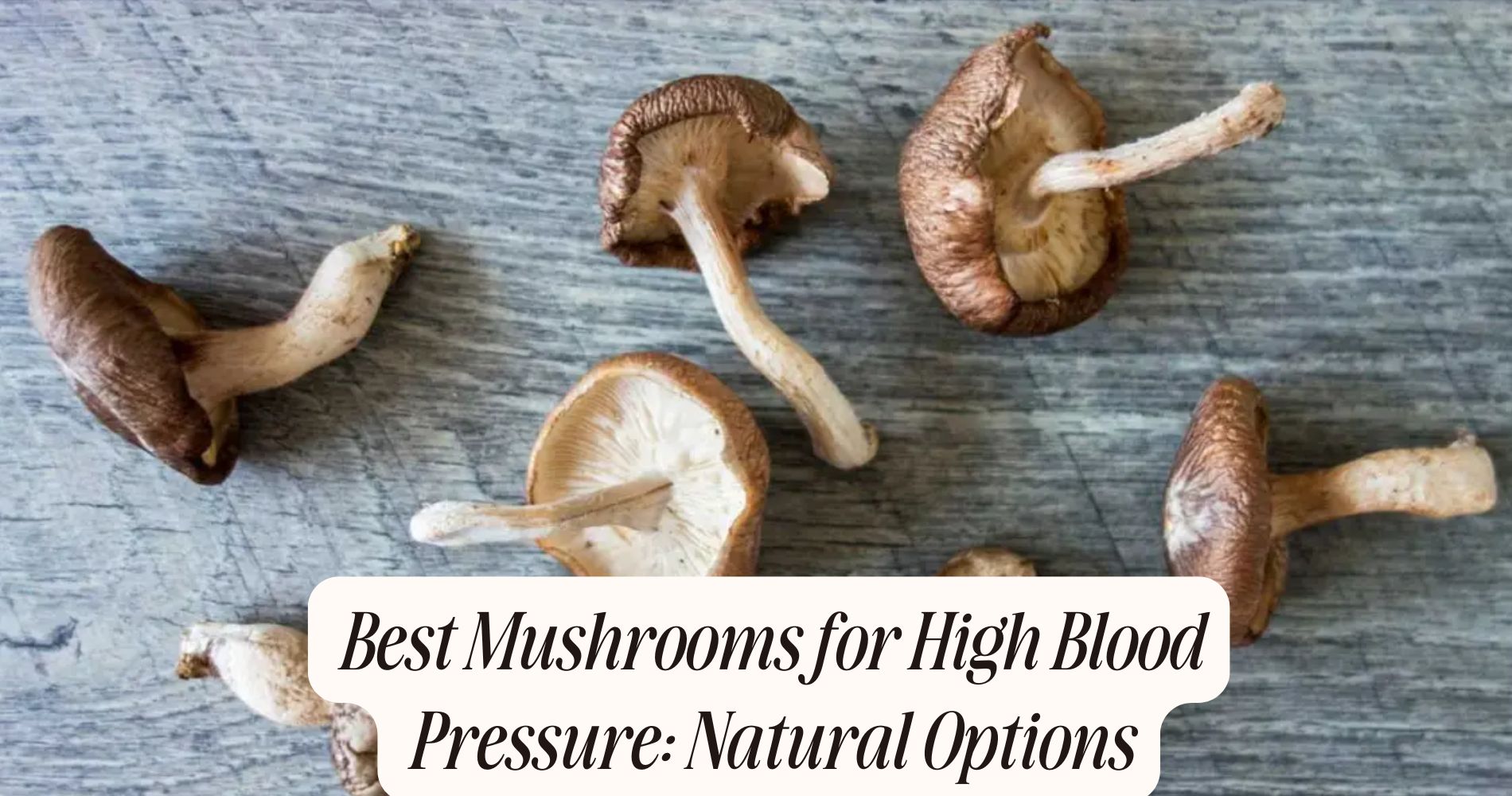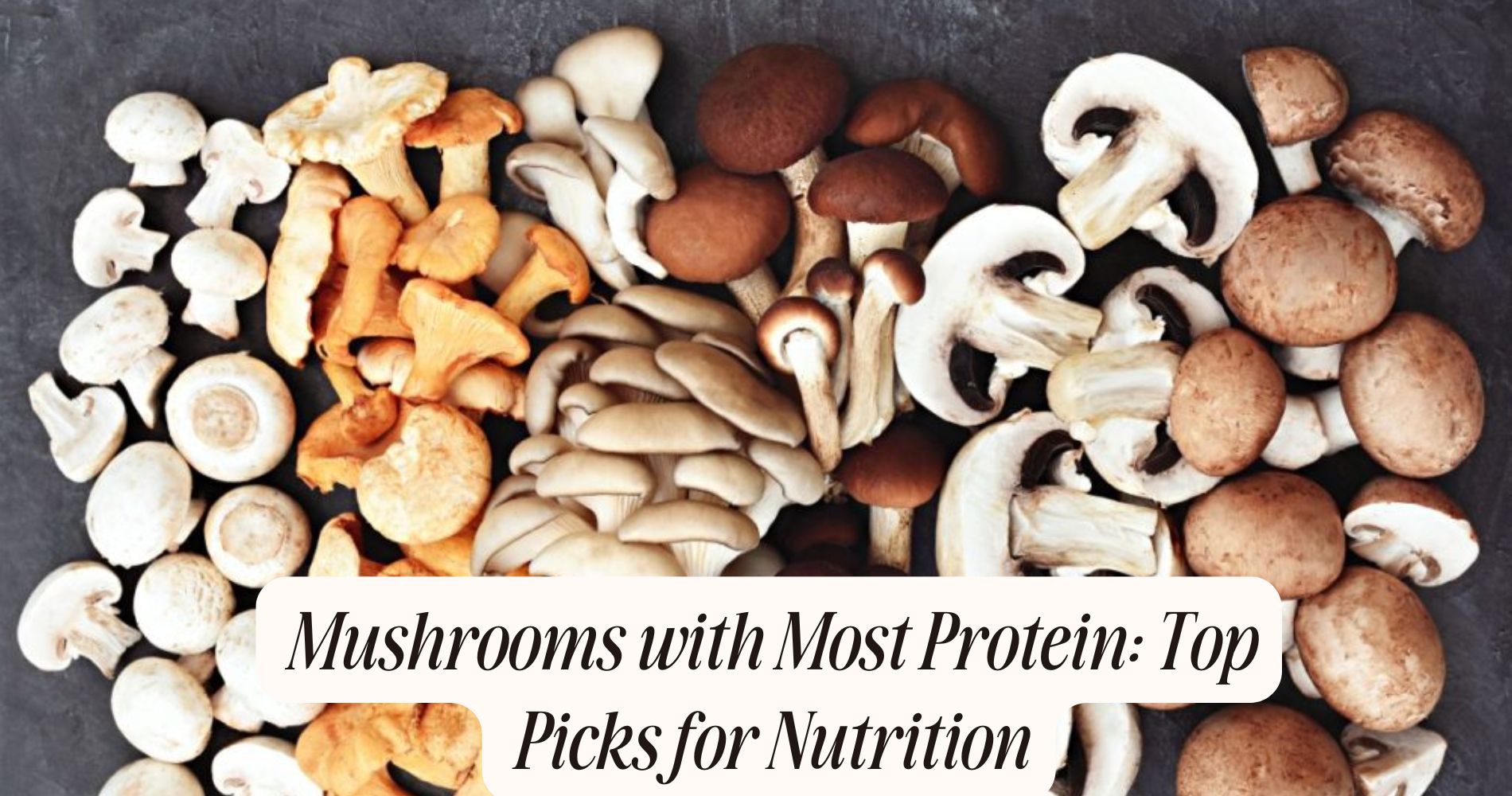
Do Mushrooms Have Vitamins? Nutritional Breakdown
Do mushrooms have vitamins? Yes, mushrooms do contain vitamins! They're rich in B vitamins like riboflavin, niacin, and pantothenic acid, which help with energy production and metabolism. Many varieties also provide vitamin D, especially when exposed to sunlight. Beyond vitamins, mushrooms offer important minerals like selenium and potassium. They're low in calories yet high in nutritional density, making them a great addition to your meals. Varieties like shiitake and portobello not only add flavor but also contribute decent protein levels. If you want to explore their benefits and culinary uses further, you'll find plenty more interesting information ahead.
Nutritional Profile of Mushrooms
When you plunge into the nutritional profile of mushrooms, you'll find they're surprisingly rich in essential nutrients. Different mushroom varieties, like shiitake, portobello, and button mushrooms, each bring unique benefits to the table.

These fungi are low in calories yet high in nutritional density, making them a fantastic addition to any meal. Mushrooms contain a range of minerals, including selenium, potassium, and copper, which support various bodily functions.
With their high water content, they help keep you hydrated while providing fiber that aids digestion. You'll also appreciate how versatile mushrooms are; they can enhance the flavor of dishes without adding extra fat or calories.
Incorporating various mushroom varieties into your diet not only boosts your nutrient intake but also adds depth to your meals. By choosing mushrooms regularly, you're tapping into a natural source of health benefits that can support your overall wellness.
Key Vitamins Found in Mushrooms
Mushrooms pack a punch when it comes to essential vitamins, especially B vitamins that support your energy levels and brain function.
You might be surprised to learn that some varieties also provide a natural source of vitamin D.
Let's explore how these key nutrients can benefit your overall health.
Essential B Vitamins
A variety of essential B vitamins can be found in mushrooms, making them a nutritious addition to your diet. These vitamins play a significant role in your body's overall health, particularly in energy production and mushroom metabolism. You'll find several B vitamins, including B2 (riboflavin), B3 (niacin), B5 (pantothenic acid), and B7 (biotin), in various mushroom types.
B vitamin sources like mushrooms can help support your nervous system and improve your mood. For instance, riboflavin helps your body convert carbohydrates into fuel, while niacin aids in DNA repair and skin health.
Pantothenic acid is important for synthesizing coenzyme A, which is essential for fatty acid metabolism. Biotin, on the other hand, supports healthy hair, skin, and nails.
Incorporating mushrooms into your meals not only enhances flavor but also boosts your intake of these essential nutrients. Whether you enjoy them sautéed, grilled, or in soups, mushrooms offer a delicious way to enrich your diet with important B vitamins.
Vitamin D Sources
Rich in vitamin D, mushrooms serve as a unique plant-based source of this essential nutrient, especially when exposed to sunlight or ultraviolet (UV) light.
Unlike most vegetables, mushrooms can produce vitamin D through a process known as vitamin D synthesis. When you expose mushrooms to sunlight, they can convert ergosterol, a compound found in their cell membranes, into vitamin D2, making them a valuable addition to your diet.
If you're looking to boost your vitamin D intake, consider adding mushrooms that have undergone mushroom sunlight exposure. Varieties like maitake and shiitake are especially potent when it comes to this nutrient. Just a small serving can provide you with a significant portion of your daily needs.

Incorporating these mushrooms into your meals is simple. You can sauté them, toss them into salads, or include them in soups for a delicious way to increase your vitamin D levels.
Health Benefits of Mushroom Vitamins
Many people underestimate the remarkable health benefits that mushroom vitamins offer. These natural powerhouses are packed with essential nutrients that can greatly enhance your well-being. One of the standout benefits is their ability to provide immune support. Mushrooms, particularly varieties like shiitake and maitake, contain compounds that can boost your immune system, helping you fend off illnesses more effectively.
In addition to immune support, mushrooms also boast impressive antioxidant properties. Antioxidants play an important role in combating oxidative stress, which can lead to various chronic diseases. By incorporating mushroom vitamins into your diet, you're not just enjoying their unique flavors but also actively working to protect your cells from damage.
Moreover, certain mushroom types are rich in B vitamins, which are essential for energy production and overall metabolic function. This means that adding mushrooms to your meals can help you feel more energized and focused throughout the day.
Comparison of Mushroom Varieties
When it comes to mushrooms, not all varieties offer the same nutritional benefits. Edible varieties like button, shiitake, and portobello mushrooms each have unique flavor profiles and nutrient densities.
For instance, shiitake mushrooms are known for their rich umami taste and high levels of polysaccharides, which may boost immunity.
Wild mushrooms, such as chanterelles and morels, can also be nutritious, but you need to exercise caution when foraging. Some wild mushrooms can be toxic, so it's crucial to know what you're picking.
Medicinal mushrooms like reishi and lion's mane aren't typically used in cooking but are gaining popularity for their health benefits. These varieties are often consumed in supplement form due to their potential cognitive and immune-boosting properties.

Mushroom cultivation has made many varieties more accessible throughout the year, but seasonal availability can still affect your choices.
For culinary uses, consider how different types of mushrooms can enhance your dishes. Whether you're sautéing, grilling, or adding them to soups, knowing the nutritional differences can help you make the best choice for your meals.
Cooking Methods and Nutritional Impact
Cooking mushrooms can greatly influence their nutritional value and flavor. When you use sauteing techniques, the high heat helps to release their natural flavors while preserving many nutrients. Quick cooking keeps water-soluble vitamins, such as B vitamins, intact, which is vital for your overall health. Just be careful not to overcook, as prolonged heat can diminish those benefits.
On the other hand, grilling mushrooms offers a different experience. The grilling effects add a smoky flavor that enhances their taste. However, grilling can also lead to a loss of some nutrients due to the extended cooking time and higher temperatures. To counteract this, consider marinating your mushrooms before grilling; this can help retain moisture and nutrients while adding extra flavor.
In both methods, it's important to avoid excessive oil or butter, which can overshadow the mushrooms' natural taste and add unnecessary calories.
Incorporating Mushrooms Into Your Diet
Elevate your meals by incorporating mushrooms into your diet in creative ways. These versatile fungi can enhance the flavor and nutrition of various dishes, making them an easy addition to your daily meals.
Whether you're a meat-lover, vegetarian, or vegan, there are mushroom recipes that cater to your dietary preferences.
Start your day with a hearty mushroom omelet or sautéed mushrooms on toast. For lunch, toss some grilled mushrooms into your salads or blend them into a creamy soup.
Dinner can feature stuffed portobello mushrooms or a savory mushroom risotto that satisfies even the pickiest eaters.

If you're looking for a quick snack, try mushroom chips or add sautéed mushrooms to your favorite grain bowls. You can also experiment by swapping meat for mushrooms in tacos or burgers, giving you a hearty, umami-rich alternative.
Don't forget to explore different mushroom varieties, like shiitake, cremini, or oyster, to find the flavors you love most.
Myths About Mushroom Nutrition
Many people enjoy mushrooms for their unique flavors and nutritional benefits, but several misconceptions can cloud their true value.
One common mushroom myth is that they're devoid of essential nutrients. In reality, mushrooms are packed with vitamins like D, B, and minerals such as selenium and potassium.
Another nutritional misconception is that all mushrooms are low in calories and high in fiber. While many varieties are indeed low in calories, some can be richer in fat or carbohydrates, depending on how they're prepared.
You might also hear that mushrooms can't contribute to your daily protein intake. This isn't true; certain types, like shiitake and portobello, can provide a decent amount of protein when included in your meals.
Lastly, some people think that mushrooms are unsafe to eat due to potential toxins. While it's true that some wild mushrooms are poisonous, the varieties you find in grocery stores are safe and nutritious.
Frequently Asked Questions
Can Mushrooms Be a Source of Protein?
Absolutely, mushrooms can be a great vegetarian protein source. Their protein content varies by type, but incorporating them into your meals can boost your overall protein intake while adding flavor and nutrients to your diet.
Are All Mushrooms Safe to Eat?
Not all mushroom varieties are safe to eat. Some can be toxic or cause allergic reactions. Always research and verify proper identification before consuming any mushrooms to guarantee safe consumption and avoid potential health risks.
How Do Mushrooms Absorb Nutrients From the Soil?
Mushrooms absorb nutrients through their mycelium, which interacts with soil composition to facilitate nutrient uptake. They break down organic matter, allowing them to efficiently gather essential minerals and compounds needed for growth and development.
Can Cooking Mushrooms Destroy Their Vitamins?
When you cook mushrooms, some cooking methods can reduce vitamin retention. Steaming or sautéing tends to preserve more nutrients compared to boiling, so choose your cooking techniques wisely to maximize their vitamin content.
Are There Any Allergies Related to Mushrooms?
Yes, there are mushroom allergies. Some people experience allergic reactions like hives, swelling, or gastrointestinal issues when consuming mushrooms. If you suspect an allergy, it's best to avoid them and consult a healthcare professional.
Conclusion
Incorporating mushrooms into your diet can boost your vitamin intake and overall health. With their rich nutritional profile, these fungi offer essential vitamins and health benefits that can enhance your meals. Whether you enjoy them raw, sautéed, or in soups, there's a mushroom variety for everyone. Don't let myths about mushroom nutrition hold you back. Embrace these versatile ingredients and enjoy their unique flavors while reaping the rewards of their nutritional goodness!




